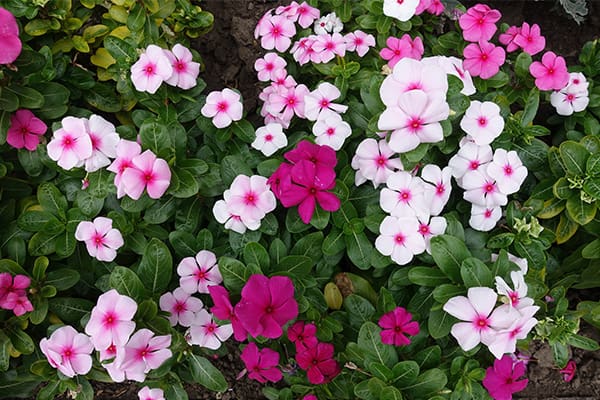01. Herbal Medicine Overview
Is Herbal Medicine a Cancer Treatment?
Herbal medicine uses plant-derived substances to treat illnesses. It is a complementary therapy some cancer patients may add to their treatment plans. Research does not show any evidence that herbal medicines can treat or cure cancer. But some herbs may serve other purposes for cancer patients.
Patients should exercise caution with herbal medicines for various reasons. Research has linked some herbs to side effects like diarrhea, nausea and skin irritation. Certain herbs may also interfere with standard medications and treatments. Beyond this, herbs are not subject to premarket evaluation by the U.S. Food and Drug Administration (FDA). This can lead to quality and safety risks.
Still, studies show some herbs may offer benefits to some cancer patients. Benefits may include relief from cancer symptoms and treatment side effects.
Mesothelioma patients should talk to their oncology teams before taking any herbal medicine. Mesothelioma doctors can explain which herbs may be appropriate for them.
Purpose of Herbal Medicine
Herbal medicines are intended to support a person’s body so it can balance and heal itself. They may be added to a traditional cancer care plan as a type of complementary medicine. Integrative oncology practitioners may also recommend herbal medicines for some patients.
Integrative oncology is a patient-centered, evidence-based field of cancer care. Along with conventional cancer treatments, it uses mind and body practices, natural products and lifestyle modifications. Integrative oncology may include nutrition changes and the use of certain herbs.
Herbal medicine is made from plants or parts of plants. For centuries, it has been part of many cultures’ healing traditions, like Traditional Chinese Medicine (TCM). People have used it for many purposes and ailments.
Patients may seek herbal medicine for various reasons. Some may feel it is a more natural, and therefore safer, approach. But in general, there are unpredictable risks when using herbal medicine.
These general risks may be more serious for cancer patients. Other risks may be cancer-specific, like herbs interfering with traditional treatments. Herbs may also have different effects than what product labels claim.
Still, some patients may be interested in herbal medicine. Doctors or qualified integrative practitioners can guide patients toward herbs that may be safe and effective for them.
02. Herbal Medicine Effectiveness
Can Herbal Medicines Effectively Fight Cancer?
There is no evidence that herbal medicines can treat or cure cancer. But some herbs may help with cancer symptoms or treatment side effects. These are not substitutes for standard therapies, though. Specific herbs may be used to complement traditional plans. Patients can work with their doctors to understand which herbs may be safe and helpful.
Beyond herbal medicines, some drugs may be derived from herbs or plants. In this process, scientists isolate a plant compound and create a modern medicine. For example, a common plant-derived medicine is aspirin, which comes from willow bark. Some plant-derived mesothelioma drugs include:
- Navelbine® (vinorelbine): The active ingredient in this chemotherapy drug comes from the Madagascan periwinkle (Vinca rosea).
- Taxol® (paclitaxel): The active ingredient in this chemotherapy drug comes from the Pacific yew tree (Taxus brevifolia).
Unlike herbal medicine, these plant-derived drugs are proven to be effective cancer treatment methods. Still, patients may wonder if researchers have found any promising herbal mesothelioma treatments.
Herbal Medicine for Mesothelioma Treatment
The rarity of a disease like mesothelioma can sometimes limit research. No current studies have treated mesothelioma patients with herbal medicine. But evidence shows some herbs may reduce mesothelioma symptoms or treatment side effects. This data came from studying an herb for different cancers, but shows:
- Some herbs can help address treatment side effects associated with mesothelioma treatments.
- Some herbs can help treat certain symptoms caused by mesothelioma and other conditions.
Researchers have not studied these herbs in mesothelioma patients. But some studies have looked at the effects of herbs on mesothelioma cells and animals with mesothelioma.
For example, a 2011 study tested curcumin (a substance in turmeric). Findings showed curcumin:
- Enhanced a chemotherapy drug’s ability to slow mesothelioma cell growth
- Slowed the growth of mesothelioma cells in a lab
- Slowed the growth of mesothelioma tumors in mice
These results may give patients hope for herbal medicine, like curcumin. But this study was only conducted on mice and mesothelioma cells in a lab. This does not mean that the herb’s effect would be the same in humans. Similar laboratory studies have used other herbs with varying results.
Resources for Mesothelioma Patients
03. Herbal Medicine Best Practices
Are Herbal Medicines Safe for Cancer Patients?
Some herbal medicines may be safe for cancer patients, but others may cause harm. Anyone interested in using herbs should first talk to their healthcare team. This is an important step for many reasons.
For instance, doctors know patients’ medical histories and can advise based on this. Doctors also know which herbs may interact with certain drugs. If appropriate, they may recommend herbs to address specific symptoms or side effects. By working with their doctors, patients can ensure they only explore using safe herbs.
In addition to talking with their doctors, patients can take some steps on their own. This may help them feel empowered and better educated about herbal medicine. Examples of patient research can include:
- Looking at label certifications
- Researching companies
- Reviewing any studies with human participants
Patients and their doctors can then discuss these findings and any questions patients may have. By working together, patients can feel confident their treatment plan supports their goals.
04. Herbal Medicine for Cancer
Herbal Medicines Sometimes Used for Cancer Treatment
Some research has studied the effects of herbal medicines on cancer patients. Though there is no evidence herbs can cure cancer, findings show some herbs may help alleviate certain cancer-related issues. These potential benefits of herbal medicine apply to cancer in general and may include mesothelioma.
Notable herbs include black cohosh, curcumin, marijuana, mistletoe extracts and resveratrol. Despite potential benefits, there are still risks to be aware of. For example, marijuana may help with nausea. But it may also interfere with immunotherapy treatment.
It is vital for patients to talk with their doctors before taking these or other herbal treatments. Potential benefits and concerns with herbal medicine vary on a case-by-case basis. Doctors can determine if herbal medicine’s potential benefits may outweigh the risks.
Turmeric
Turmeric is a flowering plant with a vibrant, orange-colored root. This plant contains the chemical compound curcumin, which is available as an herbal supplement. Evidence from cancer studies suggests curcumin may:
- Decrease inflammation during chemotherapy treatment
- Improve quality of life for chemotherapy patients
- Lessen the severity/frequency of chemotherapy side effects
Curcumin has been linked to mild side effects like diarrhea, headaches and skin rashes.
A 2022 study of curcumin in non-mesothelioma cancers found various benefits. Some patients with solid tumors took curcumin while receiving chemotherapy. They experienced significantly lower rates of chemotherapy-related side effects. These patients also needed fewer medications to manage chemotherapy side effects.
These studies are not mesothelioma-focused but may still interest patients. These study findings are encouraging, but they cannot replace the guidance of an oncologist. For their own safety, patients should talk with a mesothelioma doctor before taking any herbal medicine.
Mistletoe Extract
Mistletoe is a plant that grows on several different types of trees. Its extracts can vary because of the specific species of mistletoe and the tree it grows on. As a result, efficacy for treating conditions may be inconsistent.
Some study data indicates mistletoe extracts may improve the following for cancer patients:
- Concentration
- Depression
- Emotional well-being
- Fatigue
- Nausea
- Quality of life
- Vomiting
Reported side effects include headaches, fevers, chills and allergic reactions.
Some experts criticize the methods and parameters of many mistletoe extract studies. These weaknesses may call their results into question.
Reishi Mushrooms
Reishi is a large, dark mushroom used in several traditional medical systems. This mushroom has been a popular supplement in recent years. It has many claims of health benefits and abilities to treat serious conditions. But the actual evidence of its effects on cancer indicates reishi:
- May improve quality of life
- May increase responsiveness to chemotherapy and radiation treatment
The positive effects of reishi mushrooms may be due to the presence of beta-glucans. Beta-glucans are natural substances found in items like mushrooms, grains and yeasts. Some research suggests that mushroom beta-glucans may help fight cancer, enhance memory and reduce infection frequency and severity.
Reported side effects of reishi are relatively mild and include nausea and insomnia. These side effects and risks may seem low. But doctors can decide if taking reishi is safe for mesothelioma patients.
Black Cohosh
Black cohosh is a member of the Buttercup family of plants, native to North America. It is commonly used in Europe. Black cohosh may be used to treat many conditions, including menopausal symptoms and irregular heartbeat. Mood disorders like irritability, anxiety and depression may also be treated with the herb.
Some studies on black cohosh and cancer show it may:
- Decrease the risk of breast cancer recurrence
- Decrease the risk of developing breast cancer for postmenopausal women
- Reduce hot flash frequency and severity in breast cancer patients and survivors
Experts say the data for black cohosh is inconclusive. It’s possible most of the purported effects are from a placebo effect. But as a relatively safe herb, it warrants more research.
In general, black cohosh is very well-tolerated and rarely causes serious side effects. Serious side effects likely result from product quality issues, not the herb itself. But black cohosh may interfere with statins for cholesterol management. This is a good example of why patients should speak with their doctors before taking any herbal products.
Marijuana
The dried leaves and flowers of Cannabis plants, also called marijuana, contain cannabinoids. These are popular for a variety of recreational and medicinal uses. Evidence suggests marijuana may:
- Help relieve cancer-related pain and insomnia
- Relieve chemotherapy-induced nausea and vomiting as well as, or better than, other drugs
Reported side effects of marijuana use include bloodshot eyes, dizziness, increased heart rate and sleepiness.
Some evidence suggests Cannabis use may limit the efficacy of immunotherapy. This may be a serious risk for mesothelioma patients receiving this cutting-edge treatment. Doctors can explain if marijuana is a safe addition to their treatment plans.
Other Types of Herbal Medicines
Other herbs have some studies and evidence of their use against cancer. These have less evidence than others but may still offer some benefit. Other herbs with potential benefits include:
- Ashwagandha: May help reduce chemotherapy-related fatigue and improve quality of life. Potential side effects of ashwagandha are unclear.
- Ginger: Significantly aids in reduction of chemotherapy-induced nausea. Side effects may include gastrointestinal symptoms like heartburn, bruising, flushing and rash.
- Resveratrol: Evidence suggests resveratrol may slow the growth of certain types of tumor cells. Side effects may include nausea, diarrhea, chills, lethargy, rash, skin irritation and vascular flushing.
Other studies have found clear evidence of harm when using certain herbs. These concerns may be both general and cancer-specific. Herbs that may harm cancer patients include:
- Kava: This herb has no established benefits, general or cancer-specific. But it has been linked to serious, sometimes severe, liver damage.
- St. John’s wort: This herb may weaken the effects of life-saving medicines or cause dangerous side effects.
Regardless of how promising an herb seems, there may be risks. It is best to speak with healthcare teams before beginning any herbal supplementation.
05. Side Effects of Herbal Medicine
Herbal Medicine Side Effects
Side effects vary by the type of herb. These effects may be more common with some herbs than others. But patients’ experiences with herbs will be unique and depend on many factors. It’s important for patients to discuss herbal medicine with their doctors.
Mesothelioma specialists can explain which herbs may have negative side effects. Common herbal side effects include chills, diarrhea, insomnia, nausea and skin irritation. Doctors can also determine if any herbs may interact negatively with other treatments.
There are other serious risks with some herbs that may impact patients. For example, some herbs may increase the effects of anticoagulant drugs (blood thinners). Herbs that sometimes cause this effect include dang gui, curcumin, ginger and reishi. Cancer patients who take blood thinners may face this risk.
Herbs may seem like a natural and safe way to improve health. But herb and drug interactions are complex and varied. Mesothelioma doctors can consider patients’ full medical histories before recommending any herbs.
Herbal Medicines Cancer Patients May Want to Avoid
Some herbs have both potential benefits and risks to cancer patients. But other herbs may be dangerous or offer little to no proven benefits. It may be safest for some cancer patients to avoid these herbs altogether.
- Cannabis (or marijuana) may limit the benefits/reduce the effects of immunotherapy.
- Essiac tea is claimed to be an anti-cancer remedy, but evidence does not support the claims. In some tests, it has even increased tumor growth.
- Green tea may interfere with the effects of an anticancer drug. It may also increase the risk of side effects from other specific cancer drugs.
- Natural antioxidants may interfere with the efficacy of certain chemotherapy drugs.
- St. John’s wort can disrupt some treatment drugs, including chemotherapy.
Other herbal medicines have limited research. These herbs include cafestol, kahweol, hesperidin and licorice root. Until there is more research, their potential risks and side effects remain unknown.
06. Herbal Medicine Studies
Clinical Trials and Studies on Herbal Medicine as a Cancer Treatment
As a rare disease, existing mesothelioma research has not involved patients taking herbal medicine.
Some mesothelioma patients may be interested in joining clinical trials for herbalism. Their doctors can explain if any options are available and may be a good fit. Some cancer centers may also have information on their websites about clinical trials.
Researchers in other countries often run reputable clinical trials, too. Interested patients can find a clinical trial database online at ClinicalTrials.gov.
07. Common Questions
Common Questions About Herbal Medicine for Mesothelioma
-
How is herbal medicine used as an alternative cancer treatment?
There is no evidence that herbal medicines can treat or cure cancer. Some herbs may be safely used with standard treatments to increase patient comfort. But other herbs may interfere with cancer treatments and other medications. It’s important to first get doctors’ approval for any herbal medicines.
-
Are herbal medicines safe for cancer patients to use alongside their conventional treatments?
Some herbs are generally safe to use with traditional therapies, but others may disrupt treatment. Cancer patients may also take other drugs for unrelated conditions. Some herbs can interfere with these non-cancer medications, too. Doctors can explain if any herbs are safe for individual patients to use.
-
Which herbs are commonly used in cancer treatment and what benefits do they offer?
Some herbs may help manage cancer symptoms and treatment side effects. Common herbs patients may hear of include turmeric (curcumin), black cohosh and mistletoe extracts. In general, these herbs have mild side effects and low risks. But this can vary, so doctors should determine if these herbs are safe for each patient.
-
What herbal supplements are good for cancer?
Research does not show that herbal medicine can cure or treat cancer. But herbs like turmeric and mistletoe extracts may help with chemotherapy-related side effects. Patients may experience some mild side effects from these herbs. But some studies show promising results when used for some cancers.










